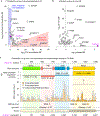Rare coding variation provides insight into the genetic architecture and phenotypic context of autism
- PMID: 35982160
- PMCID: PMC9653013
- DOI: 10.1038/s41588-022-01104-0
Rare coding variation provides insight into the genetic architecture and phenotypic context of autism
Abstract
Some individuals with autism spectrum disorder (ASD) carry functional mutations rarely observed in the general population. We explored the genes disrupted by these variants from joint analysis of protein-truncating variants (PTVs), missense variants and copy number variants (CNVs) in a cohort of 63,237 individuals. We discovered 72 genes associated with ASD at false discovery rate (FDR) ≤ 0.001 (185 at FDR ≤ 0.05). De novo PTVs, damaging missense variants and CNVs represented 57.5%, 21.1% and 8.44% of association evidence, while CNVs conferred greatest relative risk. Meta-analysis with cohorts ascertained for developmental delay (DD) (n = 91,605) yielded 373 genes associated with ASD/DD at FDR ≤ 0.001 (664 at FDR ≤ 0.05), some of which differed in relative frequency of mutation between ASD and DD cohorts. The DD-associated genes were enriched in transcriptomes of progenitor and immature neuronal cells, whereas genes showing stronger evidence in ASD were more enriched in maturing neurons and overlapped with schizophrenia-associated genes, emphasizing that these neuropsychiatric disorders may share common pathways to risk.
© 2022. The Author(s), under exclusive licence to Springer Nature America, Inc.
Conflict of interest statement
Competing interests
C.M.F. has been a consultant to Desitin and Roche and receives royalties for books on ASD, ADHD, and MDD. S.J.S. has been a consultant for, and receives funding for research from, BioMarin. J.D.B. and M.E.T. consult for BrigeBio Pharma. M.E.T. receives research funding and/or reagents from Illumina Inc., Levo Therapeutics, and Microsoft Inc. All other authors had no competing interests.
Figures






References
Publication types
MeSH terms
Grants and funding
- R01 MH123184/MH/NIMH NIH HHS/United States
- R01 MH123155/MH/NIMH NIH HHS/United States
- R01 MH099134/MH/NIMH NIH HHS/United States
- UM1 HG008895/HG/NHGRI NIH HHS/United States
- U24 ES028533/ES/NIEHS NIH HHS/United States
- U01 MH111660/MH/NIMH NIH HHS/United States
- R56 MH097849/MH/NIMH NIH HHS/United States
- T32 HG002295/HG/NHGRI NIH HHS/United States
- R01 MH116999/MH/NIMH NIH HHS/United States
- R01 HD081256/HD/NICHD NIH HHS/United States
- U01 MH111662/MH/NIMH NIH HHS/United States
- R01 MH122412/MH/NIMH NIH HHS/United States
- R01 MH123619/MH/NIMH NIH HHS/United States
- R01 MH115957/MH/NIMH NIH HHS/United States
- R37 MH057881/MH/NIMH NIH HHS/United States
- R01 MH097849/MH/NIMH NIH HHS/United States
- R01 MH129751/MH/NIMH NIH HHS/United States
- R01 MH100027/MH/NIMH NIH HHS/United States
- R01 MH057881/MH/NIMH NIH HHS/United States
- R01 MH129725/MH/NIMH NIH HHS/United States
- P30 ES023513/ES/NIEHS NIH HHS/United States
- U01 MH111658/MH/NIMH NIH HHS/United States
- R01 MH129724/MH/NIMH NIH HHS/United States
- U01 MH111661/MH/NIMH NIH HHS/United States
- R56 MH115957/MH/NIMH NIH HHS/United States
- R01 MH069359/MH/NIMH NIH HHS/United States
- R01 MH094400/MH/NIMH NIH HHS/United States
- P50 HD103537/HD/NICHD NIH HHS/United States
- R01 MH109900/MH/NIMH NIH HHS/United States
- R24 ES028533/ES/NIEHS NIH HHS/United States
- R01 HD096326/HD/NICHD NIH HHS/United States
- U01 MH100233/MH/NIMH NIH HHS/United States
- R01 MH129722/MH/NIMH NIH HHS/United States
LinkOut - more resources
Full Text Sources
Other Literature Sources
Medical

